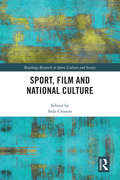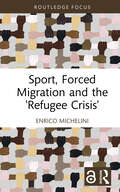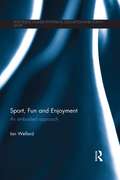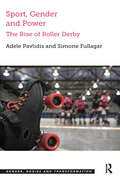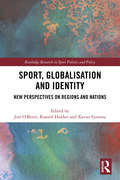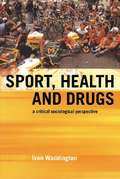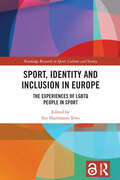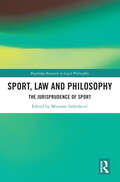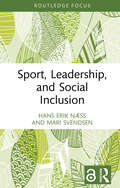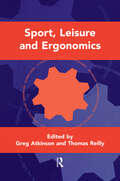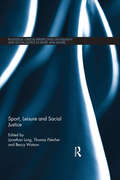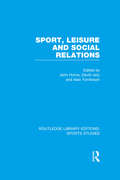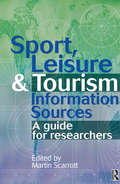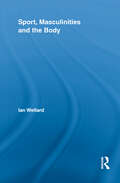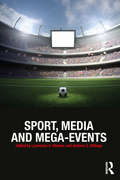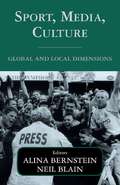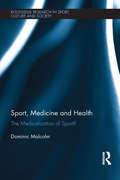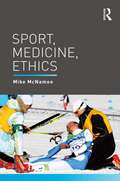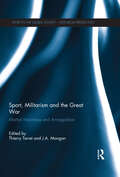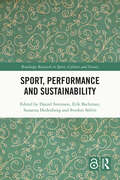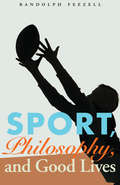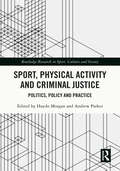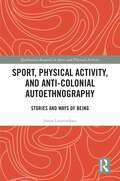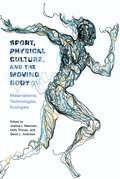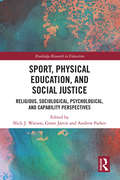- Table View
- List View
Sport, Film and National Culture (Routledge Research in Sport, Culture and Society)
by Seán CrossonSport and film have historically been key components of national cultures and societies. This is the first collection dedicated to examining the intersection of these popular cultural forces within specific national contexts. Covering films of all types, from Hollywood blockbusters to regional documentaries and newsreels, the book considers how filmic depictions of sport have configured and informed distinctive national cultures, societies and identities. Featuring case studies from 11 national contexts across 6 continents – including North and South America, Europe, Africa, Asia and Oceania – it reveals the common and contrasting approaches that have emerged within sport cinema in differing national contexts. This is fascinating and important reading for all students and researchers working in film, media, cultural studies or sport, and for broader enthusiasts of both sport and film.
Sport, Forced Migration and the 'Refugee Crisis' (Routledge Focus on Sport, Culture and Society)
by Enrico MicheliniDrawing on original research, this book looks at what sport can tell us about the social processes, patterns and outcomes of forced migration and the &‘refugee crisis&’. Adopting a systems theory framework and examining different sport disciplines, performance levels and settings, it represents a significant contribution to our understanding of one of the most urgent social issues facing the modern world. The book explores four key aspects of sport&’s intersection with forced migration. Firstly, it looks at how the media covers sport in relation to the &‘refugee crisis&’, specifically coverage of refugee elite athletes. Secondly, it examines the adaptation of sport organisations to the &‘refugee crisis&’, including the culture, programmes and structures that promote or obstruct sport for refugees. Thirdly, the book looks at sport in refugee sites, and how sport can be used as therapy, an escape or empowerment for refugees but also how it can reinforce the divisions between staff and the refugees themselves. Finally, the book looks at how forced migration influences and is influenced by participation in elite sport, by examining the biographies of elite migrant athletes. A richly descriptive, critical and illuminating piece of work, this book is fascinating reading for anybody with an interest in sport, migration, sociology or the relationship between sport and wider society.
Sport, Fun and Enjoyment: An Embodied Approach (Routledge Studies in Physical Education and Youth Sport)
by Ian WellardSport, Fun and Enjoyment explores the pleasurable aspects of sport within the context of everyday recreational and competitive physical activities. While much recent work has focused on the relationships between physical activity, health and wellbeing, much less attention has been paid to pleasure and fun, key aspects of our engagement with sport but not so easy to measure in terms of specific outcomes. By offering a critical exploration of what can be constituted as ‘fun’ in a sporting context, this book reveals the complex ways in which individuals approach sport and engage with it throughout the life course. The book considers the importance of pleasure and fun as a factor in our initial, formative experiences of sport activity, and as a factor in participation and continued participation. It explores the nature of fun as an embodied experience which incorporates a multitude of social, psychological and physiological components, and as a subjective experience which cannot be fully explained through simplistic binary formulations of pleasure and pain. Drawing on a wide research literature and original empirical research with children and adults, the book outlines a new theoretical framework for thinking about pleasure and fun in sport, highlighting the contrasting ways in which sport and physical activity is experienced and the interplay between individual and social contexts. Sport, Fun and Enjoyment is important reading for anybody with an interest in physical education, youth sport, the sociology of sport, physical activity and health, sport development or sport policy.
Sport, Gender and Power: The Rise of Roller Derby (Gender, Bodies and Transformation)
by Simone Fullagar Adele PavlidisAs a new breed of lifestyle sport enthusiasts ’derby grrrls’ are pushing the boundaries of gender as they negotiate the nexus of pleasure, pain and power relations. Offering a socio-cultural analysis of the rise and reinvention of roller derby as both a new, globalized women’s sport and an everyday creative leisure space, this book explores the manner in which roller derby has emerged as a gendered space for self-transformation, belonging and embodied contest, in which women are invited to experience their emotions differently, embrace pain and overcome limits. Sport, Gender and Power: The Rise of Roller Derby presents detailed interview, ethnographic and autoethnographic material, together with a range of media texts to shed new light on the complex relationships of power experienced by women in derby as a sport culture, whilst also examining the darker relationships that characterise the sport, including those of inclusion and exclusion, difference and identity, and competition and participation. A contemporary feminist study of empowerment, sexual difference, gender and affect, this book will appeal to scholars of gender and sexuality, embodiment, feminist thought and the sociology of sport and leisure.
Sport, Globalisation and Identity: New Perspectives on Regions and Nations (Routledge Research in Sport Politics and Policy)
by Jim O'Brien Russell Holden Xavier GinestaSport can be a vehicle for the expression of identity, and also a factor in the shaping of identity. This book explores the complex interrelationships between nations, regions and states in the landscape of contemporary international sport, with a particular focus on identity. Exploring important themes such as the geopolitics of sports events, contested identities, and ownership of sport and its impact on sporting cultures, the book presents contemporary and historical cases from around the world, including football in a divided Ireland; sport and the anti-Apartheid movement; Chinese sporting nationalism and soft power; and the role of sport media in the shaping of Catalan identity. This is an important resource for students and researchers working in Sports Studies, Sports Journalism, Sports Management Studies, Sports Marketing, Football Studies, Sport and Identity Studies, Sociology of Sport Studies, and Cultural Studies.
Sport, Health and Drugs: A Critical Sociological Perspective
by Andy Smith Ivan WaddingtonWhy do many athletes risk their careers by taking performance enhancing drugs? Do the highly competitive pressures elite sports teach athletes to win at any cost? In order to understand the complex relationships between sport and other aspects of society, it is necessary to strip away our preconceptions of what sport is, and to examine, in as detached a manner as possible, the way in which the world of sport actually functions. This fully updated edition of Ivan Waddington’s classic introduction to drugs in sport examines the key terms and key issues in sport, drugs and performance and is designed to help new students explore these controversial subjects, now so central to the study of modern sport. The book addresses topics such as: the emergence of drugs in sport and changing patterns of use the development of an objective, sociological understanding sports law, policy and administration WADA, NGB’s and the sporting federations case studies of football and cycling the case of sports medicine. An Introduction to Drugs in Sport: Addicted to Winning is a landmark work in sports studies. Using interview transcripts, case studies and press cuttings to ground theory in reality, students and lecturers alike will find this an immensely readable and enriching resource.
Sport, Identity and Inclusion in Europe: The Experiences of LGBTQ People in Sport (Routledge Research in Sport, Culture and Society)
by Ilse Hartmann-TewsThis book explores and critically assesses the challenges and experiences of LGBTQ people within sport in Europe. It presents cutting-edge research data and insights from across the continent, with a focus on sport policy, sport systems, and issues around anti-discrimination and inclusion. The book introduces the theoretical and methodological foundations of research into LGBTQ people in sport and then presents in-depth comparative surveys of systems and experiences in Austria, Belgium, France, Germany, Hungary, Italy, the UK, and Spain. A final section considers the effectiveness of policy in this area and motives for participation, and looks ahead at future directions in research, policy, and practice. Tracing the frontiers of our understanding of the experiences of LGBTQ people in contemporary Europe, this is fascinating reading for anybody with an interest in the sociology of sport, sport policy, LGBTQI studies, gender and sexuality studies, or cultural studies.
Sport, Law and Philosophy: The Jurisprudence of Sport (Routledge Research in Legal Philosophy)
by Miroslav ImbriševićSport, Law and Philosophy: The Jurisprudence of Sport discusses the intersection of law and sport and highlights its usefulness to both legal scholars and philosophers of sport. There is a general recognition that law and sports bear strong similarities. Both can be understood as systems of rules, with a judge/referee who has the power to adjudicate and to issue punishments/penalties. Divided into two parts, this volume presents an exploration of central philosophical issues arising from the intersections of law and sport and makes reference to current events and controversies. Experts from across the globe discuss a range of issues such as sports as legal systems, the game as a social contract, the role of the referee, including VAR, rule breaking, equality in women’s sport, justice on the sports field and in the court room, and issues surrounding the application of law to sports. The book will be a valuable resource to Undergraduates, Postgraduates and for those working in the areas of legal philosophy, sports law, and philosophy of sport.
Sport, Leadership, and Social Inclusion (Routledge Focus on Sport, Culture and Society)
by Hans Erik Næss Mari SvendsenThis book considers how sport organizations can create inclusive practices to strengthen social progress, focusing on the importance of leadership in fostering positive change.Drawing on original research, and adopting a meso-level, multi-disciplinary approach that includes perspectives from sport management, the sociology of sport and organizational psychology, the book considers the evidence for sport as a vector of social progress. Featuring qualitative interviews with non-profit sport leaders from organizations across Europe, the book looks at the conditions under which social inclusion through sport is possible and examines the challenges and opportunities related to three areas of inclusivity and exclusivity: access, participation, and empowerment.Offering a new perspective on how leadership can help unlock the potential of sport as an inclusive force in society, this book is an important read for anybody with an interest in sport development, sport management, social inclusion, or the relationship between sport and wider society.
Sport, Leisure and Ergonomics
by Greg Atkinson Thomas ReillyThe field of sports ergonomics is now recognised as an interdisciplinary area in its own right. This book forms the proceedings of the 3rd International Conference on Sport, Leisure and Ergonomics, providing a particular focus on disabled athletes, health and fitness educations and sports equipment.
Sport, Leisure and Social Justice (Routledge Critical Perspectives on Equality and Social Justice in Sport and Leisure)
by Jonathan Long Beccy Watson Thomas FletcherSocial inequalities are often reproduced in sport and leisure contexts. However, sport and leisure can be sites of resistance as well as oppression; they can be repressive or promote positive social change. This challenging and important book brings together contemporary cases examining different dimensions of inequality in sport and leisure, ranging from race and ethnicity to gender, sexual orientation, disability, religion and class. Presenting research-based strategies in support of social justice, this book places the experiences of disadvantaged communities centre stage. It addresses issues affecting participation, inclusion and engagement in sport, while discussing the challenges faced by specific groups such as Muslim women and LGBT young people. Including original theoretical and methodological insights, it argues that the experiences of these marginalised groups can shed a light on the political struggles taking place over the significance of sport and leisure in society today. Sport, Leisure and Social Justice is fascinating reading for students and academics with an interest in sport and politics, sport and social problems, gender studies, race and ethnicity studies, or the sociology of sport.
Sport, Leisure and Social Relations (Routledge Library Editions: Sports Studies)
by John Horne David Jary Alan TomlinsonWhen this book was first published the study of sport had been largely neglected by sociologists. The contributions to this volume bring the sports field, the leisure centre and everyday leisure activities to a more central position within the sociological enterprise. Whether amateur or professional, sport contributes to wider relations of power, privilege and domination and this debate represents an important phase in the sociology of sport and leisure.
Sport, Leisure and Tourism Information Sources
by Martin ScarrottSport, Leisure and Tourism is a practical guide to finding information, encouraging readers to make active use of libraries in their research. This book provides readers with an understanding of the major information search tools which are available. It is a starting point in the search for information which offers advice and indicates some of the major sources which are available. Sport, Leisure and Tourism Information Sources is aimed primarily at final year undergraduate and postgraduate students who are preparing a dissertation in the area of sport and leisure studies who need access to information sources. It is also ideal for academics for teaching purposes and practitioners in the sport and leisure industry needing to undertake research.
Sport, Masculinities and the Body (Routledge Research in Sport, Culture and Society)
by Ian WellardThis groundbreaking work explores masculinity and the body within sports. Sports continue to retain expectations for presentations of specific forms of masculinity. The body is central to these presentations. These everyday bodily performances are rehearsed and performed either successfully or unsuccessfully - and the consequences of these actions play a significant part in the ability of the individual to continue to take part. Through participant observations, sporting life-history interviews (with over forty men) and research with children, this book examines the ways in which 'appropriate' sporting masculinities are learned and enacted to varying degrees of success. Wellard highlights the social processes which impact upon individual constructions and formulations of masculine identity and reviews these in relation to broader debates on gender, embodiment and sporting participation. This book contributes not only to the academic fields of sport and gender, but also to the efforts to confront continued forms of 'accepted' gender discrimination.
Sport, Media and Mega-Events
by Lawrence A. Wenner and Andrew C. BillingsBringing together many of the most influential scholars in sport and media studies, this book examines the diverse ways that media influences our understanding of the world’s most important sport events, dubbed sports mega-events. It sheds new light on how these events have been changed by the media, and have, in turn, adapted to media to further their brand’s cultural influence. Focusing on the central concept of "mediatization" – the permeation of media into all spheres of contemporary life – the book presents original case studies of major events including the Olympics, FIFA, rugby and cricket World Cups, Tour de France, Super Bowl, World Series, Monaco Grand Prix, Wimbledon, and many more. Written from a truly international perspective, this is a seminal work in sport and media studies that reveals the growing political, economic, and cultural influences of sport mega-events in contemporary society. Sport, Media and Mega-Events is an essential text for any course on the sociology of sport, event management, sport marketing, or featuring a cultural, communication or media studies approach to sport.
Sport, Media, Culture: Global and Local Dimensions (Sport in the Global Society #No. 36)
by Alina Bernstein Neil BlainAn examination of the central features of the sport-media phenomenon, focusing on Europe and the USA. The book analyses such issues as new media technology; gender, ethnicity and local dimensions of collective identity; women in American basketball advertising; and cult football radio in Scotland.
Sport, Medicine and Health: The medicalization of sport? (Routledge Research in Sport, Culture and Society)
by Dominic MalcolmThe relationship between sport, medicine and health in our society is becoming increasingly complex. This important and timely study explores this relationship through an analysis of changing political economies, altered perceptions of the body and science’s developing contribution to the human condition. Surveying the various ways in which medicine interacts with the world of sport, it examines the changing practices and purposes of sports medicine today. Drawing on the latest research in the sociology of sport, this book investigates the scientific discourse underlying the promotion of physical activity to reveal the political context in which medical knowledge and public policies emerge. It considers the incongruities between these policies and their attempts to regulate the supply of and demand for sports medicine. Through a series of original case studies, this book exposes the social construction of sports medical knowledge and questions the potential for medicine to influence athletes’ well-being both positively and negatively. Sport, Medicine and Health: The medicalization of sport? provides valuable insights for all students and scholars interested in sports medicine, sports policy, public health and the sociology of sport.
Sport, Medicine, Ethics
by Mike McNameeThe ethics of sports medicine is an important emerging area within biomedical ethics. The professionalization of medical support services in sport and continuing debates around issues such as performance-enhancing technologies or the health and welfare of athletes mean that all practitioners in sport, as well as researchers with an interest in sports ethics, need to develop a clear understanding of the ethical aspects of the sport–medicine nexus. This timely collection of articles explores the conceptual and practical issues that shape and define ethics in sports medicine. Examining central topics such as consent, confidentiality, pain, doping and genetic technology, this book establishes an important baseline for future academic and professional work in this area.
Sport, Militarism and the Great War: Martial Manliness and Armageddon (Sport in the Global Society - Historical Perspectives)
by J. A. Mangan Thierry TerretThe Great War has been largely ignored by historians of sport. However sport was an integral part of cultural conditioning into both physiological and psychological military efficiency in the decades leading up to it. It is time to acknowledge that the Great War also had an influence on sport in post-war European culture. Both are neglected topics.Sport, Militarism and the Great War deals with four significant aspects of the relationship between sport and war before, during and immediately after the 1914-1918 conflict. First, it explores the creation and consolidation of the cult of martial heroism and chivalric self-sacrifice in the pre-war era. Second, it examines the consequences of the mingling of soldiers from various nations on later sport. Third, it considers the role of the Great War in the transformation of the leisure of the masses. Finally, it examines the links between war, sport and male socialisation. The Great War contributed to a redefinition of European masculinity in the post-war period. The part sport played in this redefinition receives attention.Sport, Militarism and the Great War is in two parts: the Continental (Part I) and the "Anglo-Saxon" (Part II). No study has adopted this bilateral approach to date. Thus, in conception and execution, it is original.With its originality of content and the approaching centenary of the advent of the Great War in 2014, it is anticipated that the book will capture a wide audience.This book was originally published as a special issue of The International Journal of the History of Sport.
Sport, Performance and Sustainability (Routledge Research in Sport, Culture and Society)
by Sverker Sörlin Daniel Svensson Erik Backman Susanna HedenborgThis book examines the logic of ‘faster, higher, and stronger’ and the technoscientific revolution that has driven tremendous growth in the sports economy and in sport performance over the last 100 years. It asks whether this logic needs revisiting in the light of the climate crisis and sport’s environmental responsibilities. Drawing on multi-disciplinary work in sport history, sport pedagogy, sport philosophy, sport science, and environmental history, the book considers not only how sportification may have contributed to the growing environmental impact of sport but also whether it might be used as a tool of positive social change. It reflects on the ways that sport sets performance limits for other ethical reasons, such as doping controls, and asks whether sport could or should set limits for environmental reasons too. Sport, Performance and Sustainability touches on key themes in sport studies, including digitisation, activism, social media, empowerment, youth sport, and physical education. This is fascinating reading for anybody with an interest in sport, the environment, development, sociology, or culture. Daniel Svensson is an Associate Senior Lecturer in Sport Management at the Department of Sport Sciences, Malmö University, Sweden. He has written several book chapters and articles about the relationship between sport, science, technology, and the environment. Erik Backman is an Associate Professor and Senior Lecturer in Pedagogy and Sport Sciences at the Department of Sport Sciences, School of Health and Welfare, Dalarna University, Sweden, and Associate Professor at the Department of Primary and Secondary Teacher Education, Faculty of Education and International Studies, Oslo Metropolitan University, Norway. His main research interest is in outdoor education, physical education, and sport pedagogy. Susanna Hedenborg is a Full Professor in Sport Sciences at Malmö University, Sweden, and the President of the Swedish Research Council for Sport Science. Hedenborg has a background in social and economic history and her sport research has focused on gender issues, children and youth sport, and equestrian sports. Sverker Sörlin is a Professor of Environmental History in the Division of History of Science, Technology and Environment, KTH Royal Institute of Technology, Sweden, and a co-founder of the KTH Environmental Humanities Laboratory. His research is on the role of knowledge in environmentally informed modern societies and in research and innovation policies. Current research interests include the history of environmental climate governance.
Sport, Philosophy, and Good Lives
by Randolph FeezellThere&’s more to sports than the ethos of competition, entertainment, and commercialism expressed in popular media and discourse. Sport, Philosophy, and Good Lives discusses sport in the context of several traditional philosophical questions, including: What is a good human life and how does sport factor into it? To whom do we look for ethical guidance? What makes human activities or projects meaningful? Randolph Feezell examines these questions along with other relevant topics in the philosophy of sport such as the contribution of play to a meaningful life, the various reasons for pessimistic views of sport, the various claims that celebrated athletes are role models, and the seldom-questioned view that coaches are in a position to offer advice to athletes on how to live or on leadership skills. He also discusses the way that non-Western attitudes found in Buddhism, Taoism, and the Bhagavad Gita might be used to address the vulnerabilities of sports participants.Feezell draws from current sports issues, popular literature, and contemporary sports figures to shed light on the attraction and value of sports and examine the accompanying ethical issues.
Sport, Physical Activity and Criminal Justice: Politics, Policy and Practice (Routledge Research in Sport, Culture and Society)
by Andrew Parker Haydn MorganThis book explores the various ways in which participation in sport and physical activity might contribute to effective solutions within criminal justice systems. Focusing on a range of different sporting and physical activities across an array of social contexts involving both adult and youth populations, the book offers insight into the way in which sport and physical activity is interpreted by participants and practitioners, and how these interpretations relate to broader policy objectives within and across justice systems. It focuses on a series of key issues, including how sport policy (national and international) has developed in recent years in this area; how and to what extent such policy developments have impacted organisations and interventions (both custodial and non-custodial) across sport and criminal justice systems and sectors; and how participant cohorts (such as disadvantaged and/or ‘at-risk’ young people) have experienced these changes. With shifting debates around criminal justice and the need for policy and practical solutions to extend beyond tougher and longer sentencing, this book is important reading for students, researchers, and practitioners working in sport pedagogy, sport-for-development, sport and leisure management, sport coaching, physical education, criminology, youth work, youth studies, social work, and health studies.
Sport, Physical Activity, and Anti-Colonial Autoethnography: Stories and Ways of Being (Qualitative Research in Sport and Physical Activity)
by Jason LaurendeauThis book offers a brief history of how autoethnography has been employed in studies of sport and physical (in)activity to date and makes an explicit call for anti-colonial approaches - challenging scholars of physical culture to interrogate and write against the colonial assumptions at work in so many physical cultural and academic spaces. It presents examples of autoethnographic work that interrogate physical cultural practices as both produced by, and generative of, settler colonial logics and structures, including research into outdoor recreation, youth sport experiences, and sport spectatorship. It situates this work in the context of key paradigmatic issues in social scientific research, including ontology, epistemology, axiology, ethics and praxis, and looks ahead at the shape that social relations might take beyond settler-colonialism. Drawing on cutting-edge research and presenting innovative theoretical perspectives, this book is fascinating reading for anybody with an interest in physical cultural studies, sport studies, outdoor studies, sociology, cultural studies, or qualitative research methods in the social sciences.
Sport, Physical Culture, and the Moving Body: Materialisms, Technologies, Ecologies (Critical Issues in Sport and Society)
by David Andrews Samantha Frost Simone Fullagar Mary Louise Adams Samantha King Pirkko Markula Michael D. Giardina Matthew G. Hawzen Oliver Rick Jacob J. Bustad Richard Pringle Mary G. McDonald Kiri Baxter Douglas Booth Kyle S Bunds Mariana Clark Simon C Darnell Jennifer Sterling Christopher McLeod Shannon Leigh Jette Katelyn Esmonde Carolyn Pluim Gavin WeedonThe moving body—pervasively occupied by fitness activities, intense training and dieting regimes, recreational practices, and high-profile sporting mega-events—holds a vital function in contemporary society. As the body moves—as it performs, sweats, runs, and jumps—it sets in motion an intricate web of scientific rationalities, spatial arrangements, corporate imperatives, and identity politics (i.e. politics of gender, race, social class, etc.). It represents vitality in its productive and physiological capacities, it drives a complex economy of experiences and products, and it is a meaningful site of cultural identities and politics. Contributors to Sport, Physical Culture, and the Moving Body work from a simple premise: as it moves, the material body matters. Adding to the burgeoning fields of sport studies and body studies, the works featured here draw upon the traditions of feminist theory, posthumanism, actor network theory, and new materialism to reposition the physical, moving body as crucial to the cultural, political, environmental, and economic systems that it constitutes and within which is constituted. Once assembled, the book presents a study of bodies in motion—made to move in contexts where technique, performance, speed, strength, and vitality not only define the conduct therein, but provide the very reason for the body’s being within those economies and environments. In so doing, the contributors look to how the body moving for and about rational systems of science, medicine, markets, and geopolity shapes the social and material world in important and unexpected ways. In Sport, Physical Culture, and the Moving Body, contributors explore the extent to which the body, when moving about both ostensibly active body spaces (i.e., the gymnasium, the ball field, exercise laboratory, the track or running trail, the beach, or the sport stadium) and those places less often connected to physical activity (i.e. the home, the street, the classroom, the automobile), is bounded to technologies of life and living; and to the political arrangements that seek to capitalize upon such frames of biological vitality. To do so, the authors problematize the rise of active body science (i.e. kinesiology, sport and exercise sciences, performance biotechnology) and the effects these scientific interventions have on embodied, lived experience. Contributors to Sport, Physical Culture, and the Moving Body will be engaging a range of new and emerging theoretical perspectives, including new materialist, political ecology, developmental systems theory, and new material feminist approaches, to examine the actors and assemblages of movement-based material, political, and economic production. In so doing, contributors will vividly and powerfully illustrate the extent to which a focus on the fleshed body and its material conditions can bring forth new insights or ontological and epistemological innovation to the sociology of sport and physical activity. They will also explore the agency of the body as and amongst things. Such a performative materialist approach explicates how complex assemblages of sport and physical activity—bringing into association everything from muscle fibers and dietary proteins to stadium concrete or regional aquifers—are not only meaningful, but ecological. By focusing on the confluence of agentive materialities, disciplinary technologies, vibrant assemblages, speculative realities, and vital performativities, Sport, Physical Culture, and the Moving Body promises to offer a groundbreaking departure from representationalist tendencies and orthodoxies brought about by the cultural turn in sport and physical cultural studies. It brings the moving body and its physics back into focus: recentering moving flesh and bones as locus of social order, environmental change, and the global political economy.
Sport, Physical Education, and Social Justice: Religious, Sociological, Psychological, and Capability Perspectives (Routledge Research in Education)
by Nick J. Watson; Grant Jarvie; Andrew ParkerThis interdisciplinary collection explores the nexus of social justice and sport to consider how sport and physical education can serve as a unique point of commonality in an era of religious, political, economic, and cultural polarity. Originally published as a special issue of Quest, Sport, Physical Education, and Social Justice offers timely theoretical perspectives from the fields of theology, philosophy, psychology, and sociology. The volume demonstrates the multiple ways in which sport can be used to overcome inequalities and marginalization relating to gender, race, disability, religion, and sexuality, and posits sports education as a powerful mechanism for addressing school-based issues including bullying, racism, and citizenship education. Truly international in scope, the text includes contributions from scholars addressing issues in both formal and informal sports education settings, communities, and locales. Sport, Physical Education and Social Justice will be of interest to researchers, scholars, policy makers and advocates in the fields of education, psychology, sociology, and religious studies.
